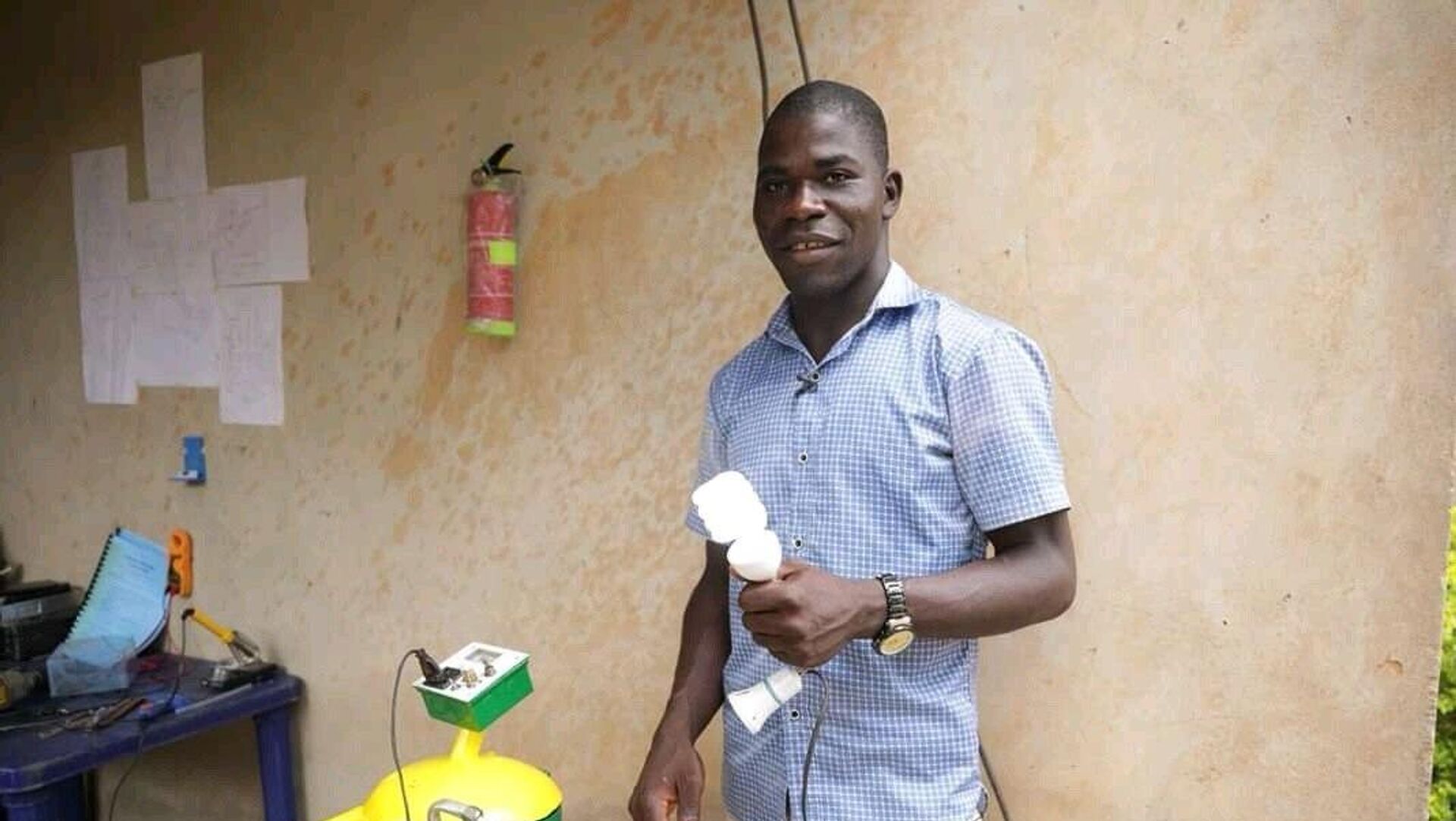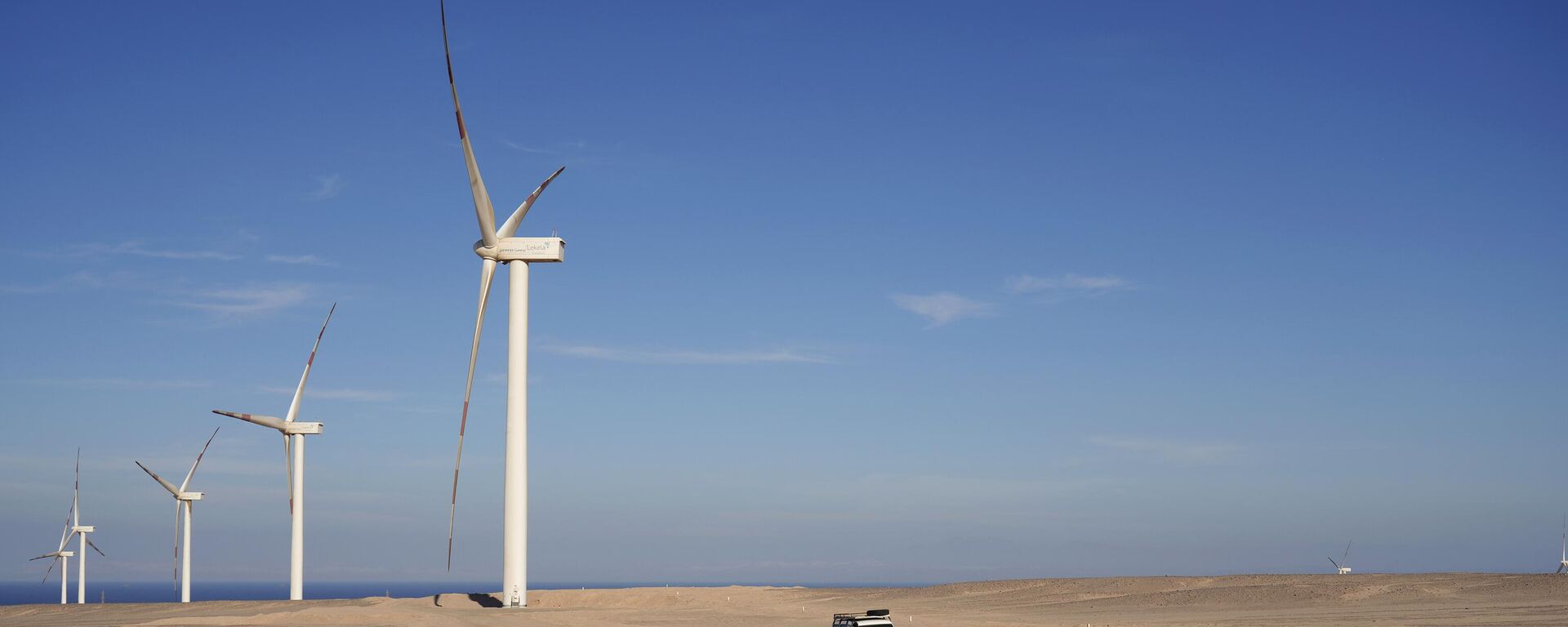https://en.sputniknews.africa/20240516/future-depends-on-us-nigerian-inventor-who-turned-waste-into-electricity-1066576954.html
'Future Depends on Us:' Nigerian Inventor Who Turned Waste Into Electricity
'Future Depends on Us:' Nigerian Inventor Who Turned Waste Into Electricity
Sputnik Africa
On May 16, the world celebrates the International Day of Light, which aims to raise awareness of the advances and benefits of light technology in improving the... 16.05.2024, Sputnik Africa
2024-05-16T18:34+0200
2024-05-16T18:34+0200
2024-05-16T19:08+0200
opinion
nigeria
sputnik africa
waste
electricity
recycling
invention
science
west africa
africa in details
https://cdn1.img.sputniknews.africa/img/07e8/05/10/1066580263_0:0:1068:602_1920x0_80_0_0_b1a203e65506c46dcb9b76ba6b35af84.jpg
Investing in renewable energy will help humanity achieve a better future, Emeka Nelson Ugwueze, a 29-year-old Nigerian inventor who generates electricity using waste and other renewable sources, told Sputnik Africa.And the African continent, according to Nelson, can be the center of this trend as it has favorable conditions like solar or hydro energy.However, it will not be possible to achieve success in this matter without adequate support.But how did Nelson come up with such an idea? As the inventor said, sometimes the "inadequacies" of the environment push us to look for solutions. Power outages and the detestation of kerosene lamps led Nelson, while still a boy, to start studying physics and other sciences in order to later create a way to convert waste into electricity.Moreover, now he has also created a model of a machine that produces electricity from water, which is sometimes quite abundant in Nigeria when there are heavy rains in the country that cause floods.However, Nelson faced several challenges along the way. For example, the school did not create an environment that encouraged his endeavors.Another problem was the lack of funding.Fortunately, the Nigerian managed to cope with these difficulties and invent new technologies that are more relevant than ever because the problem of waste disposal worries the whole world now, and the use of Nelson's technology would help the planet get rid of huge landfills, while countries suffering from shortages of electricity would help fill this need.Wrapping up, the young inventor left an inspiring message, calling on people to embark on a difficult but important path of change.
https://en.sputniknews.africa/20240509/renewable-sources-generate-record-30-of-global-electricity-in-2023-energy-think-tank-says-1066442478.html
nigeria
west africa
Sputnik Africa
feedback@sputniknews.com
+74956456601
MIA „Rossiya Segodnya“
2024
Christina Glazkova
https://cdn1.img.sputniknews.africa/img/07e7/0b/07/1063380906_0:0:673:674_100x100_80_0_0_79628b4d0cd9f29291a57aa13bbf9e7a.jpg
Christina Glazkova
https://cdn1.img.sputniknews.africa/img/07e7/0b/07/1063380906_0:0:673:674_100x100_80_0_0_79628b4d0cd9f29291a57aa13bbf9e7a.jpg
News
en_EN
Sputnik Africa
feedback@sputniknews.com
+74956456601
MIA „Rossiya Segodnya“
Sputnik Africa
feedback@sputniknews.com
+74956456601
MIA „Rossiya Segodnya“
Christina Glazkova
https://cdn1.img.sputniknews.africa/img/07e7/0b/07/1063380906_0:0:673:674_100x100_80_0_0_79628b4d0cd9f29291a57aa13bbf9e7a.jpg
nigeria, sputnik africa, waste, electricity, recycling, invention, science, west africa, africa in details
nigeria, sputnik africa, waste, electricity, recycling, invention, science, west africa, africa in details
'Future Depends on Us:' Nigerian Inventor Who Turned Waste Into Electricity
18:34 16.05.2024 (Updated: 19:08 16.05.2024) Christina Glazkova
Writer / Editor
Longread
On May 16, the world celebrates the International Day of Light, which aims to raise awareness of the advances and benefits of light technology in improving the quality of life around the globe. Sputnik Africa spoke with one of the people who make this world a little brighter.
Investing in
renewable energy will help humanity achieve a better future,
Emeka Nelson Ugwueze, a 29-year-old Nigerian inventor who generates electricity using waste and other renewable sources, told
Sputnik Africa.
"We move with the trend, or the trend actually leaves us behind. [...] Especially now that almost the whole world is interested in climate. So renewable energy is actually the future now. And that's why a lot of multinationals are actually investing so much. Countries are actually investing so much in it. So I think the future depends on us. If we decide to go along with the trend, with the movement, and at least do our own part, once we can, invest in talent, invest in startups that can actually find out that they have a bright future to work on all these things," he said.
And the African continent, according to Nelson, can be the center of this trend as it has favorable conditions like
solar or hydro energy.
"We really need to be at the center of it [ the trend] because our environment is so good. Just for example, in terms of solar, we have a very good environment for that. Even for hydro, we don't have most of what is natural disasters here. So, meaning that all these technologies and things that have to do with renewables definitely get to work better in this part of the world. If we do what we are supposed to do," the inventor added.
However, it will not be possible to achieve success in this matter without adequate support.
"We need the right support. If we have the right environment, the right investment, the right education and everything, I think we should be able to have all it takes to solve our problems. Our people are doing a whole lot of great things," Nelson said.
But how did Nelson come up with such an idea? As the inventor said, sometimes the "inadequacies" of the environment push us to look for solutions. Power outages and the detestation of kerosene lamps led Nelson, while still a boy, to start studying physics and other sciences in order to later create a way to convert waste into electricity.
Moreover, now he has also created a model of a machine that produces electricity from water, which is sometimes quite abundant in
Nigeria when there are heavy rains in the country that cause
floods."I felt that there was a need to solve a problem; there's a problem to solve. And I took it up. [...] I think the first design I did then was only able to transform those plastic wastes into kerosene that people used to cook. From then on, I kept on developing the machine gradually. Then, at some point, I was able to create one that could split whatever was in the plastic; I was able to get both petrol, kerosene and diesel, even paraffin from the plastic waste," he recalled.
However, Nelson faced several challenges along the way. For example, the school did not create an environment that encouraged his endeavors.
"[...] Even in our schools today, should I say the enabling environment is not there, is one of the main issues I faced because I imagine being a kid and having to create everything from scratch. And being very inquisitive, I literally had to read. I could literally tell you that I started reading both physics, geography from primary school [...] while I was trying to find answers," he said.
Another problem was the lack of
funding."So funding also has to do with the kind of enabling environment, and sometimes, just as we start looking for crude implementations, crude equipment tools to put all these things together. So I think number one is an enabling environment. Secondly, right education and mentorship, then another one has to do with the funding. So these are three major things," he summed up.
Fortunately, the Nigerian managed to cope with these difficulties and invent new technologies that are more relevant than ever because the problem of waste disposal worries the whole world now, and the use of Nelson's technology would help the planet get rid of huge landfills, while
countries suffering from shortages of electricity would help fill this need.
"In fact, plastic waste is one of the greatest menaces we have today. [...] I'm sure if we have something like this in a very large format, what is going to happen is that all those landfills and the plastics [...] [are] going to disappear. [...] [It] is actually going to improve the condition of the environment, our atmosphere. [...] Number [two], this is [going] to solve the issue of electricity, especially in Nigeria. So Nigeria is going to create jobs," Nelson shared his hopes.
Wrapping up, the young inventor left an inspiring message, calling on people to embark on a difficult but important path of change.
"Nothing will change until you start doing something. You don't need to be perfect. Be very inquisitive. Do something. That in your mind starts somewhere today. It's not going to be easy, but you end up making something out of it. That's just it," Nelson concluded.



